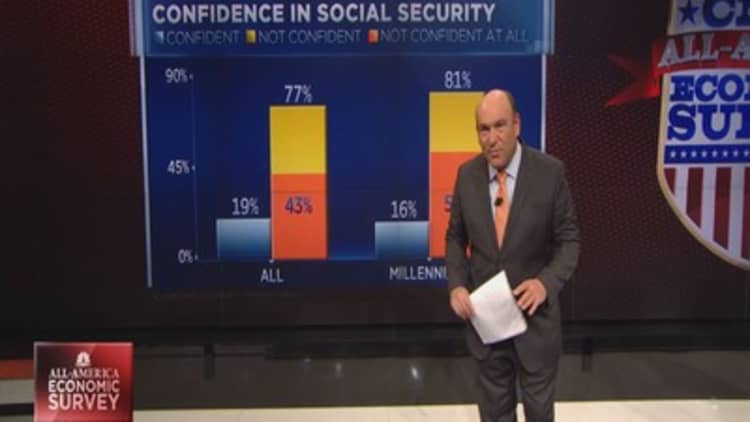




"It never really crossed my mind," 23-year-old Julie Kronick said about life insurance when she was got her first job out of college at a nonprofit in New York.
"They don't offer insurance, it didn't come up and I didn't particularly care," Kronick said.
That's the sentiment shared by many millennials about life insurance even though the insurance industry has taken great steps to target the massive pool of potential young buyers — who now surpass baby boomers as the nation's largest living generation — to no avail.
Although the majority of millennials said they need more life insurance, only 11 percent of those between 18 and 34 years old said they're very likely to buy it, according to 2015 study by insurance research and consulting firm Limra.
"We know that as a generation, they are getting married later, buying homes later, having babies later," said Todd Silverhart, Limra's director of insurance research. "Their needs for insurance are being postponed as well."
The majority of millennials, like Kronick, also said life insurance was too expensive and they had other financial priorities that far outweigh buying it.
"Living in New York City is pretty expensive," said Kronick, who shares an apartment with roommates in Brooklyn. "The extra expense could hurt my budget."
Sixty-seven percent of millennials cited keeping up with daily expenses such as rent, groceries and paying the electric bill as financial priorities over purchasing life insurance, according to Limra. Twenty-six percent said saving for a vacation was more important.
"It's concerning to see that while many adults think they need life insurance, a significant portion are putting off purchasing a policy," said Yaron Ben-Zvi, CEO of Haven Life, an online term insurance provider. "Our research also uncovered that 67 percent of those surveyed would leave behind debt if they died today, thus potentially putting their families in a difficult financial situation."
Unlike the traditional way of purchasing life insurance, which requires meeting with a salesperson and undergoing a medical exam, Haven Life lets users apply for and receive life insurance coverage online — a process that aims to attract younger consumers. The site also has a life insurance calculator to determine how much coverage is needed. Otherwise, a financial planner can help determine the amount and type — and how to figure it into the budget.
Research shows that millennials, who are saddled with hefty student debt thanks to rising tuition costs since the recession, have struggled to set money aside for other purchases — from life insurance to buying a home. On average, student borrowers who graduated this year owe more than $35,051, according to Mark Kantrowitz, a student financial aid policy expert and publisher of Edvisors.com.
"Life insurance really should be a source of consideration, particularly if you have debt," said Amy Jo Lauber, founder of Lauber Financial Planning in West Seneca, New York. "A lot of millennials have credit card debt, auto loans and are struggling to make ends meet, but who will be left responsible if they pass away?"
A life insurance policy that covers the amount owed to lenders can act as a way of protecting those loans from becoming a loved one's burden.
Those who do have a life insurance plan through their employer, which is often a $50,000 policy, might also consider adding to their coverage, Lauber said, especially if they have a lot of debt or young children. And those work-based plans are only good as long as you remain employed by that employer. If you plan to switch jobs or are uncertain, additional coverage may be a particularly good idea, she added.
Scott Laughlin, vice president of community and creditor relations at Consumer Credit Counseling Service of Buffalo, suggests millennials purchase a term policy rather than a more expensive whole-life policy. Term life insurance is only good for the number of years that the term specifies. "Twenty years is what you need when you are building a family," he said. "That will cover birth until college."
It's also often less expensive than people expect, around $160 a year for a 20-year term with $250,000 of coverage for a healthy 30-year-old, according to Limra.
It's not unusual to transfer to a whole-life policy or get another term policy. Life insurance does get increasingly more expensive with age. But if the kids are grown and out on their own, a parent may not need as much life insurance coverage.




